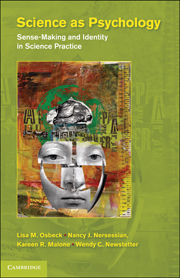Book contents
- Frontmatter
- Contents
- Acknowledgments
- 1 Introduction: Science and Persons
- 2 Methods of Study
- 3 The Problem-Solving Person
- 4 The Feeling Person
- 5 The Positioning Person
- 6 The Person Negotiating Cultural Identities
- 7 The Learning Person
- 8 Epilogue: Science as Psychology: A Tacit Tradition and Its Implications
- References
- Index
7 - The Learning Person
Published online by Cambridge University Press: 05 July 2011
- Frontmatter
- Contents
- Acknowledgments
- 1 Introduction: Science and Persons
- 2 Methods of Study
- 3 The Problem-Solving Person
- 4 The Feeling Person
- 5 The Positioning Person
- 6 The Person Negotiating Cultural Identities
- 7 The Learning Person
- 8 Epilogue: Science as Psychology: A Tacit Tradition and Its Implications
- References
- Index
Summary
Learning is among the first topics covered in introductory psychology textbooks, typically after chapters on sensation, perception, and neuroscience. This prominent positioning reflects in part its importance in the greater history of psychology as a laboratory discipline. Although most robustly embraced as essential to psychology's concerns by behaviorists (Skinner, 1938, 1953; Watson, 1913), concern with learning overlaps with the shift to analysis of representations and memory mechanisms central to the cognitive revolution (Baars, 1986). In application, learning is the obvious core of educational psychology, but implicitly it is also the very machinery of clinical intervention, being a matter of “relatively permanent change in behavior or mental processes due to experience” (Huffman, 2010, p. 203). This definition is taken from an introductory psychology textbook and is typical of those given for learning in general psychology textbooks.
The breadth invited by the definition of learning as “relatively permanent change due to experience” ensures its analysis at multiple levels of organization, from synapse to culture. Learning is thus central to our focus on the acting person, a unit of analysis we consider to reflect multiple levels of process and engagement in various interactive systems – despite the fact that we must by necessity narrow the focus to different levels at different times for the sake of imposing order and seeking clarity.
Thus in contrast to the convention honored by most general psychology texts of explicitly focusing on learning early in the sequence of chapters, learning is here the last topic prior to our overall conclusions.
- Type
- Chapter
- Information
- Science as PsychologySense-Making and Identity in Science Practice, pp. 195 - 218Publisher: Cambridge University PressPrint publication year: 2010

